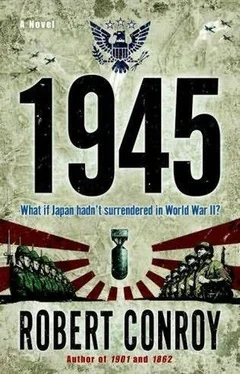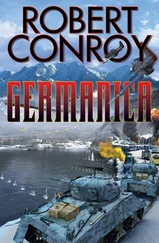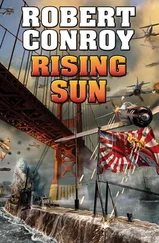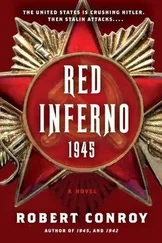Robert Conroy - 1945
Здесь есть возможность читать онлайн «Robert Conroy - 1945» весь текст электронной книги совершенно бесплатно (целиком полную версию без сокращений). В некоторых случаях можно слушать аудио, скачать через торрент в формате fb2 и присутствует краткое содержание. Жанр: Альтернативная история, на английском языке. Описание произведения, (предисловие) а так же отзывы посетителей доступны на портале библиотеки ЛибКат.
- Название:1945
- Автор:
- Жанр:
- Год:неизвестен
- ISBN:нет данных
- Рейтинг книги:3 / 5. Голосов: 1
-
Избранное:Добавить в избранное
- Отзывы:
-
Ваша оценка:
- 60
- 1
- 2
- 3
- 4
- 5
1945: краткое содержание, описание и аннотация
Предлагаем к чтению аннотацию, описание, краткое содержание или предисловие (зависит от того, что написал сам автор книги «1945»). Если вы не нашли необходимую информацию о книге — напишите в комментариях, мы постараемся отыскать её.
1945 — читать онлайн бесплатно полную книгу (весь текст) целиком
Ниже представлен текст книги, разбитый по страницам. Система сохранения места последней прочитанной страницы, позволяет с удобством читать онлайн бесплатно книгу «1945», без необходимости каждый раз заново искать на чём Вы остановились. Поставьте закладку, и сможете в любой момент перейти на страницу, на которой закончили чтение.
Интервал:
Закладка:
Robert Conroy
1945
INTRODUCTION
By the summer of 1945, the Japanese were thoroughly and utterly defeated. Their cities were rubble, their navy nonexistent, their economy destroyed, and their people near starvation. By all rights, they should have surrendered.
But surrender wasn't in the vocabulary of the militarists who ran the nation. They lived by the code of Bushido, which condemned surrender. Instead, they wished to fight until an honorable peace was achieved and felt they had good reasons for doing so.
First, they considered the recent agreement among the Allies, the Potsdam Declaration, to be a plan to destroy both Japan and her culture. This was intolerable to them.
Second, they considered any possible occupation of Japan and any subsequent war crimes trials to be mortal insults. So too were any thoughts of making the powers of the emperor subject to the will of the people. After all, didn't the emperor own the people?
Third, a few were pragmatic and felt that defeat would mean their personal doom.
Many in the military felt otherwise, and a great number of the civilian government and population wanted peace, but these people were powerless to do anything about it. In the naive and racist hatreds of the day, many Japanese thought that the Americans would rape, murder, and then cannibalize Japanese dead.
It took the shocks of the nuclear assaults on Hiroshima and Nagasaki, along with the Soviet attack into Manchuria and elsewhere, to give the Japanese peace movement the motivation and the rationale to seek peace. Even then, the governing Japanese hierarchy was sharply divided. The military, led by the army, wished to continue fighting. The army was largely intact and had several million armed and trained men ready to defend the home islands against invasion.
When Emperor Hirohito required that they sue for peace, the army bent to his will.
Yet peace was still far from certain. That night, a handful of rebellious officers led several hundred enlisted men on a rampage throughout the Imperial palace in search of Hirohito and the recordings of a peace message he'd made to be broadcast to the world the next day.
The rebels begged the war minister, army general Korechika Anami, for support. Anami was torn between his desire to continue the war and his loyalty to his emperor and, as a result, did nothing. If the coup succeeded, he would support it. If not, he would not oppose the surrender.
The rebels then confronted the commander of the Imperial Guards at the palace. When he refused to support them, the rebels shot him. This infuriated the guards, who then began to fight the rebels, thus dooming the coup. By morning the coup was over and most of the rebel leaders had committed suicide.
But what if Anami, who had all the armies of Japan at his disposal, had decided to support the coup? The Imperial Guards would have aided the rebels, Hirohito would have been captured or killed, and the war would not have ended on August 14, 1945. Instead, it would have required an invasion of the Japanese home islands by the armed forces of the United States of America. Instead of peace, the United States would have been forced into Operation Downfall, the bloodiest campaign in its history.
The first phase, Olympic, would have been the invasion of Kyushu on or about November 1, 1945, while the second phase, Coronet, would have been the invasion of Honshu about six months later. Most American planners agreed that a bloody American victory would have been won by the end of 1946. The soldiers, sailors, and marines who would have constituted the invading force were nowhere near as optimistic.
Additional atomic weapons would have been used against Japan. Cities such as Kokura and Niigata were already on the short list of targets, and more would have been added.
This novel tells what could have occurred if the coup had succeeded, and the United States been required to invade Japan.
To simplify matters, I have given all Japanese names and relevant terms in the American manner and have ignored any references to dates that might be different because of the international date line.
My major sources for the planned invasion were The Invasion of Japan by John Ray Skates, Downfall by Richard Frank, and Code-Name Downfall by Norman Polmar and Thomas B. Allen, all of which give great detail and were invaluable resources. Also, Mr. Truman's War by J. Robert Moskin provided marvelous insights into the issues, personalities, and motives of the people involved, while The Fall of Japan by William Craig detailed the attempted coup.
– Robert Conroy
PROLOGUE
The Son of Heaven sat cross-legged and stoic on the simple bamboo mat that covered the stark concrete floor of the shelter. His head and shoulders were covered by a fine layer of dust, and his nostrils recoiled at the smell of smoke that carried the sickly sweet stench of burning flesh. He felt as if he were suffocating, but he willed himself to remain calm. This squalid room was almost all that remained of an empire that, only a few short years earlier, had encompassed half the world.
The bomb shelter had been constructed to provide him and a select handful of others in the government and the Imperial family with a degree of safety from the incessant rain of American bombs. Although the B-29s and other bombers appeared to have been ordered not to aim for the Imperial palace grounds, mistakes occurred and the sacred buildings in central Tokyo had sustained damage, enough to set up protection of the mortal body of the frail and nearsighted emperor from the death that fell from the skies.
Someone explained to the incredulous emperor that a demonic gust of wind could send a bomb far off its intended course. He thought it amazing that mere air could alter the course of a falling bomb and change the fate of those beneath it. Some would live and some would die, all because of an errant zephyr.
But now, Hirohito thought bitterly, the concrete and steel shelter that had cost such great manpower and material was likely to be his tomb, not his refuge. Above him, Japanese soldiers fought and died to change Japan's future. Tragically, these were not Japanese fighting the Americans, but Japanese fighting other Japanese over the right to die for him and for Japan. Like the wind on the bomb's descent, uncertainty of his and his nation's fates pervaded his thoughts.
Hirohito had fully understood the determination of the military, particularly the army, to prolong the uneven struggle against the hated Americans beyond all reason. Their fanatic devotion to the code of the warrior, Bushido, screamed their defiance of an implacable enemy who had the power to destroy all life on the home islands of Japan. Hirohito decided on a course of action that would preserve life, not destroy it.
The first atomic bomb used in warfare had destroyed Hiroshima in a ball of fire that consumed many tens of thousands of men, women, and children and left many thousands more to live their lives in unspeakable horror. Three days later, a second bomb had incinerated Nagasaki with the same results, although Hirohito's experts had informed him that the death toll was somewhat lower than Hiroshima's. Why, they did not know.
This, coupled with the continuing nonnuclear fire bombings and bombardments of cities and towns throughout Japan, convinced Hirohito that there was no sense in further struggles against the inevitable. Most of Japan's cities were scorched rubble, and there was no way of stopping the Americans from inflicting more pain on his beloved nation.
At a meeting with his war cabinet, he shocked them by doing something never before done in such a meeeting. He had spoken directly to them. The emperor, always present, maintained a regal silence regarding the issues under discussion. It was, in fact, against the Japanese constitution for him to voice an opinion.
Читать дальшеИнтервал:
Закладка:
Похожие книги на «1945»
Представляем Вашему вниманию похожие книги на «1945» списком для выбора. Мы отобрали схожую по названию и смыслу литературу в надежде предоставить читателям больше вариантов отыскать новые, интересные, ещё непрочитанные произведения.
Обсуждение, отзывы о книге «1945» и просто собственные мнения читателей. Оставьте ваши комментарии, напишите, что Вы думаете о произведении, его смысле или главных героях. Укажите что конкретно понравилось, а что нет, и почему Вы так считаете.












